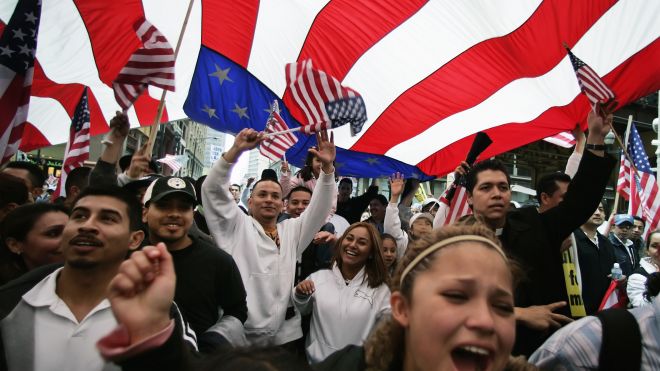By now regular visitors to this site will have seen the images coming out of Murrieta, California, where an angry mob this week blocked three buses from delivering immigrant detainees apprehended in southern Texas. Presumably among the close to 140 detainees on-board the buses were unaccompanied child migrants from Central America, tens of thousands of whom have shown up at the U.S.-Mexico border already this year. The protesters, mostly white, a few illiterate, waved American flags and chanted “USA! USA!”—as if the children making the hazardous trek from places like Honduras and El Salvador with the sole intention of destroying this country.
But who, I ask, is more capable of appreciating all that America is than an immigrant desperate to improve their lives?
Take my grandmother, for instance. She was born and raised in Santa Lucia, a tiny village nestled in the green mountains of central Honduras. Times were so tough back then, she used to play with rocks like most girls play with dolls, giving them names and having imaginary conversations with them.
While normally I’d dismiss anything my grandma tells me as 99 percent exaggeration, considering that Honduras today is one of the poorest countries in Western Hemisphere (its GDP per capita is just under $2,300 and about 30% live with less than $2 per day), it’s safe to conclude the old lady isn’t kidding when she says she talked to rocks.
Even as a Latino American who grew up in a single-parent, working-class household, my tour of Honduras in 2011 was like traveling to country struggling to rebuild after a string of catastrophes. Many people live in shacks with corrugated tin roofs. The relatives I stayed with in the capital didn’t have running water. Instead there was a large stone basin in the bathroom that contained the family’s water for the week, and you used old food containers of varying sizes to scoop out water whenever you needed to brush your teeth, flush the toilet, bathe or wash the dishes. Everyone looked forward to Wednesday mornings, when the city would refill the tank with tepid water, which prompted each member of the family to line up for the cubicle with a drain in the floor used as a bathing stall.
Again, this was in the capital city.
There’s plenty more to tell, but if my description of the plumbing situation in Honduras doesn’t illustration how indigent and underdeveloped the country is, I don’t know what will.
The reason I’m telling you this is because back in 1970, my dear old grandma, then in her late twenties, decided to leave Honduras and head to the United States: Chicago, to be exact. She was a wild-eyed young mother with three daughters, and she felt herself suffocating by the lack of opportunities in her homeland. She didn’t know much about America, but she knew it was the land of opportunity, where a person could carve out a decent life (better than almost anything in Central America) if they were just willing to work hard. My grandma arrived not knowing a lick of English and found work in the factories. Ten years later she bought the home she lives in today, and she opened a clothing boutique, earning enough money to send my mom and my aunts to an all-girls Catholic school. Now in her retirement, she’s been to over 20 different countries several times, always booking a trip to some new place she could have never dreamed of visiting had she stayed in Santa Lucia.
If there’s anyone who loves this country and what it represents, it’s my grandma. Yet most nativists seem to be under the impression that immigrants are intrinsically anti-American.
Most conservatives seem to feel the same way about progressives in general, and about Latino progressives doubly so. Being a Latino progressive myself, I’m often confronted with the charge of hating America and preferring chaos to order. Whenever I participate in a predominately Latino march or rally, bystanders are usually present to point the finger and say we’re only there to cause trouble, to criticize and to tear down.
Why is that conservative demonstrations are always labeled patriotic, while progressive ones are labelled subversive? Since when do conservatives have a monopoly on loving America?
Well let me be the first to notify conservatives that we Latino progressives are just as patriotic as any Gadsden-waving ‘Murican you’ll see spitting at a brown face in Murrieta. Heck, I’m at least twice as patriotic as any of those toothless, misspelling xenophobes.
And it shouldn’t come as a shock to anyone to learn that Latino progressives are a patriotic bunch. They’ve seen us marching through the streets of America’s major cities. There’s hardly an area of the country that hasn’t born witness to one of our massive rallies. And it’s not the kind of rallying that the Tea Party folks and those Westboro crazies engage in, the kind that’s against something or someone. Latino progressives typically rally for something—the fair treatment of immigrants, affordable health care, decent housing, better schools, equality, justice.
Our love for this country is evinced by our very being in the streets at all, since the desire to march, when done for something and not against something, usually springs from two patriotic feelings: one, caring in the first place, and two, believing the country can be better than it is. Any Latino progressive marching or rallying for a cause must possess those two basic feelings of love for their country before they even begin making a single placard.
But however much Latino progressives love America, that’s how much we hate what this country does on a regularly basis, the injustices it perpetrates day in and day out.
Latinos and their immigrant forbearers love the idea of America —an idea which spawned so many other ideas throughout Latin America and beyond— but we condemn the reality of America, which has lead to graver realities elsewhere in the Americas. Without the spirit of the American Revolution and the U.S. Constitution, there may have never been the Grito de Dolores in Mexico, the Latin American wars of independence, the Grito de Lares in Puerto Rico, the Grito de Yara in Cuba and even the Mexican Revolution. Without America’s paternalistic imperialism, however, Latin America might’ve developed into a much safer and more prosperous region than it is today, which would’ve in turn seen far fewer people fleeing their homelands and seeking safe havens.
We know that America, if she wants to, can the fairest and most tolerant nation in the world. We know she can open her arms to immigrants again and be a warm pillow for weary heads everywhere. Already we see how the tide has shifted on so many issues once believed to be beyond the pale, specifically on gay rights and marriage equality. We’ve seen America’s youth mobilize to elect the country’s first black president, and Latinos move to reelected him even when corporations and billionaires funded the other side. (Our votes still count.) We know that America can be the multicultural, cosmopolitan that it is on paper, so long as we all put our shoulders to the wheel.
That’s why Latino progressives march and protest. Not to tear down America, but to build her up.
And that’s why tens of millions of immigrants have come here from Latin America, to add to the great American saga. As the son and grandson of immigrants, showing anything less than patriotism toward the United States would be a slap in the face to my mother and grandmother, who left behind everything they knew so that I could reach for everything they never dreamed of. It’s due to their belief in this country, and due to America being at least partly what immigrants believe it is, that I’m able to write this on a laptop from a decent apartment, with running water, plus so much more.
It’s thanks to America that I’m able to write at all, or better put, that I’m able to conceive of writing as something I can devote my life to. Sure, Latin America has its share of dreamers, but in America, the desire to be an artist or open a clothing boutique or even be president seems less like a dream and more like a possibility. Even with a widening wealth gap and education gap, Americans from all walks of life still dream. (Whether we achieve our dreams is another story and frankly besides the point.)
That’s what makes America exceptional—not because of what it is or does, but because of the ideas it gives people, that they can do and be anybody they want. Few people in Latin American think about Germany or Denmark what they think about America, and myth or not, it’s a powerful myth that leads people to dream big and accomplish extraordinary things.
I can already hear the chorus of objections people will fling at my calling America exceptional. American exceptionalism is supposed to be more conservative territory. But America is a special place, a special idea. It just takes staying in a city like San Pedro Sula in Honduras (murder capital of the world) or Ciudad Juárez in Mexico (from where I’ve recently returned) to truly understand what makes America special. It’s not the violence in such places that erodes people’s souls. It’s the hopeless that floats like a fog over everything. The people there have little faith that their society will improve much or that government institutions will help them form their own identity—which maybe why people in those places tend to be more religious than political, because they view prayer as being much more useful than voting.
What those hateful protesters in Murrieta don’t understand is that immigrants have always made America better. Irish, Italians, Eastern Europeans, Asians—all have contributed something to this country that most of us now consider inseparable from it. Each wave brought something different, and America was different after they arrived. But America was also better because of their coming.
Latinos are the latest wave, and we’re still making our contributions, sewing our patching into the American quilt. America’s changing because of us, which is what the nativists fear, as most people fear change. But Latino progressives are excited about the change. We know the Latino community has a lot to offer this country that has so much to offer us.
Which is why we’ve come here, with our eyes and ears open, ready to receive and ready to contribute, waving tiny American flags.
***
Hector Luis Alamo, Jr. is a Chicago-based writer. You can connect with him @HectorLuisAlamo.





[…] This Latino Progressive Is Patriotic Too […]